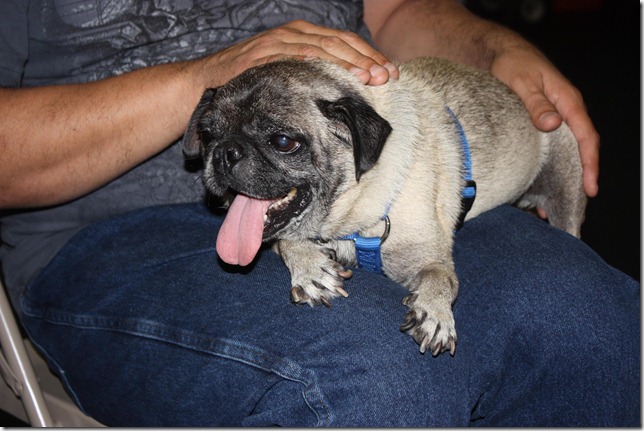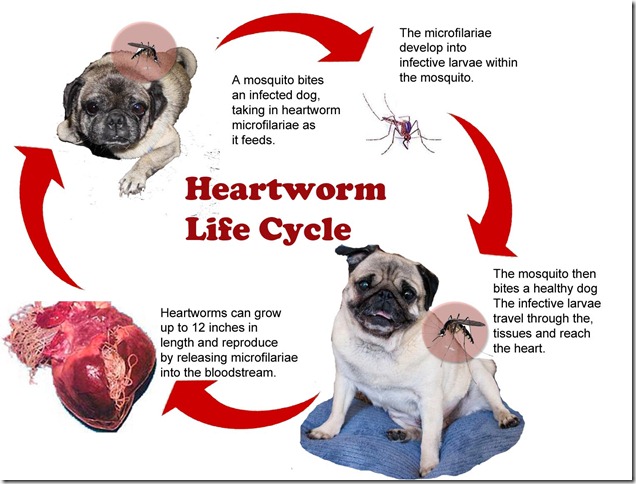I’ll never forget the fear and anger I felt in 2005 when my vet told me my newly-adopted pug, Chucky, was heartworm positive. Since I’ve been involved with PugHearts we have taken in and treated hundreds of HW+ dogs, and I personally have cared for half a dozen pugs who have gone through the treatment. It has never become routine for me, and I am angered each and every time. This disease is totally preventable! Monthly heartworm preventative costs so little compared to the treatment costs.
Heartworms are an internal parasite of both dogs and cats. These worms live in the bloodstream and cause life threatening disease. Heartworms are a leading cause of lung and heart disease in dogs and dogs are dying of this disease every day. Just this month we lost sweet CoCo: 
Heartworm disease is caused by the parasite, Dirofilaria immitis. It is transmitted by mosquitoes and has been found in every state in the US. It only takes one mosquito bite for your dog to get heartworms and, without prevention; there is a 100% chance your dog will get it.
Last weekend we had an adoption event at Rover Oaks and I met an adorable little guy called Ricky. This tiny little guy is severely heartworm positive, with an enlarged heart. It broke my heart to watch him struggle to breathe. This was much more serious than the cough we usually see as the first symptom.

The way a dog becomes infected with these parasites is the stuff of nightmares. Infected dogs are the breeding ground for the next dog to become infected. When a mosquito bites an infected dog, it ingests immature heartworms known as microfilaria. Microfilaria is the larval form of heartworms that change within the mosquito to reach the third stage. It is the third stage that can infect your dog. When the infected mosquito bites your dog, it deposits third stage microfilaria on your dog's skin and the microfilaria enters the dog through mosquito's bite wound. The microfilaria then travel or migrate through the tissues (meaning skin, muscle, connective tissue) and mature to become a juvenile adult or fifth stage larvae.

This process takes about 50-70 days in the dog. Sometime between 70 and 110 days after the dog is infected, the larvae reach the blood stream and end up in the arteries of the lung (pulmonary arteries). These juveniles then grow up to produce microfilaria of their own in about six months.
Heartworms cause the most harm just by being present in the major arteries of the lung, the pulmonary arteries. They wreak havoc in these arteries and the entire dog suffers. It happens on many levels and here is a list of the damages:
- Injury to the lining of the pulmonary arteries (pa).
- Pulmonary hypertension, or Increased pressure within the pa due to the presence of the heartworms, the thickening of pa walls, scarring and blockage of pa, and pieces of heartworm that lodge in pa or clots that form and lodge in pa (known as heartworm emboli). Pulmonary hypertension is then responsible for right sided heart disease, even right sided congestive heart failure. The severity of pulmonary hypertension is dependent on the number of adult heartworms, thus, the larger the number of heartworms, the more severe the disease.
- Changes within the lung itself. These changes include the infiltration of lung by eosinophils, a white blood cell that takes part in the immune response to allergy and parasitism. Eosinophils are capable of causing and perpetuating a severe inflammatory response which damages the lung and leads to scarring of the lung. Other white blood cells and inflammatory cells may invade the lung causing damage. The heartworms can actually block an artery (thrombosis) and, in areas where thrombosis has occurred, nodules made up of inflammatory cells known as granulomas may form.
- Vena Cava Syndrome. This syndrome strikes fear in the heart of every veterinarian. It can happen when there are excessive numbers of adult heartworms in the pulmonary arteries and the heart to the extent that they block blood returning from the liver and the back of the body. This results in severe pulmonary hypertension, the death of liver cells, and the destruction of red blood cells. Large numbers of adult heartworms can interfere with the closing of the valve on the right side of the heart (tricuspid valve) and cause increased speed of flow through this valve exacerbating these problems.
-
Serious injury to other organs, especially the kidneys, due to the deposition of damaging immune complexes formed between heartworm proteins and antibodies the dog produces against them.
Our director, Cindy, recently sent out an e-mail telling all foster families that the medication we use  to treat heartworms, Immiticide, is going to be unavailable for an indefinite period of time. Merial, the company that makes this drug, is working to correct the issue, but at this time is unable to fill any new orders for Immiticide. According to a Merial spokesman, the company is “officially out” of the drug, following an unexpected run on the supply after sending a letter to vets warning of a shortage that may “last several weeks to months.”
to treat heartworms, Immiticide, is going to be unavailable for an indefinite period of time. Merial, the company that makes this drug, is working to correct the issue, but at this time is unable to fill any new orders for Immiticide. According to a Merial spokesman, the company is “officially out” of the drug, following an unexpected run on the supply after sending a letter to vets warning of a shortage that may “last several weeks to months.”
There is a small supply available at Sugarland Pet Hospital, but small is the key word here. It will be reserved for special cases. Cindy and Dr Hendrix will work together to make decisions about which fosters will go through this treatment.
What will the impact be for PugHearts? Heartworm positive fosters will have to wait longer before treatment and even potential adoptions may be delayed, meaning we will have more dogs to care for. What do we do when our small supply of Immiticide runs out? The American Heartworm Society supports a protocol using a combination of a heartworm preventative and doxycycline (an antibiotic) to manage infestation — a protocol the society is expected to release as as guidelines for practitioners on treating heartworm-positive dogs without Immiticide.
 Dr. Tom Nelson, a past president of the American Heartworm Society and a practitioner at the Animal Medical Center in Anniston, Ala., notes that the use of doxycyline in combination with heartworm preventive has been shown to reduce pathology, the number of adult worms and the infective potential of microfilaria in canine patients. Treating heartworm is tricky business. An infected dog, for example, must not vigorously exercise because an increase in heart rate raises the risk that fragments of dead worms in its blood vessels could cause thromboembolism — the formation of an embolism, in this case of dead worms — to the lungs, which usually presents as acute shortness of breath. The condition is treatable with steroids but may prove fatal. Nelson notes that Immiticide quickly kills worms, thereby shortening the time that a dog's exercise must be restricted.
Dr. Tom Nelson, a past president of the American Heartworm Society and a practitioner at the Animal Medical Center in Anniston, Ala., notes that the use of doxycyline in combination with heartworm preventive has been shown to reduce pathology, the number of adult worms and the infective potential of microfilaria in canine patients. Treating heartworm is tricky business. An infected dog, for example, must not vigorously exercise because an increase in heart rate raises the risk that fragments of dead worms in its blood vessels could cause thromboembolism — the formation of an embolism, in this case of dead worms — to the lungs, which usually presents as acute shortness of breath. The condition is treatable with steroids but may prove fatal. Nelson notes that Immiticide quickly kills worms, thereby shortening the time that a dog's exercise must be restricted.
Slow-kill therapies, such as the use of heartworm preventatives, potentially allow for greater opportunity in which worms might block blood vessels, leading to worse lung problems. Exercise will need to be restricted during the duration of the treatment which may be over a year without Immiticide.
So now, more than ever, it’s extremely important to keep your dogs on heartworm preventative and to give it monthly on a regular schedule! Lets all say a prayer for our heartworm positive rescue dogs, too.